Stop by NewPages Magazine Stand to find publisher descriptions for new online issus from our sponsor magazines, and a list of new issues of other online literary magazines. If you’d like to be listed on this page, all you need to do is send me notice of your new issues online: denisehill-at-newpages.com. I’d certainly like to see more listings here to keep this feature going.
NewPages Blog
At the NewPages Blog readers and writers can catch up with their favorite literary and alternative magazines, independent and university presses, creative writing programs, and writing and literary events. Find new books, new issue announcements, contest winners, and so much more!
New Lit on the Block :: Canarium Journal
 Canarium is the occasional journal of Canarium Books. The first issue, Canarium 1, was published in early 2008 at the University of Michigan, and is sponsored by the Institute for the Humanities, the International Institute, Arts on Earth, the MFA in Creative Writing Program, and Rackham Graduate School. Two of Canarium’s editors, Joshua Edwards and Nick Twemlow have co-edited an independent occasional journal, The Canary, with Anthony Robinson since 2002.
Canarium is the occasional journal of Canarium Books. The first issue, Canarium 1, was published in early 2008 at the University of Michigan, and is sponsored by the Institute for the Humanities, the International Institute, Arts on Earth, the MFA in Creative Writing Program, and Rackham Graduate School. Two of Canarium’s editors, Joshua Edwards and Nick Twemlow have co-edited an independent occasional journal, The Canary, with Anthony Robinson since 2002.
Issue 1 includes: Arda Collins, Takashi Hiraide, Sawako Nakayasu, Ed Roberson, Alan Gilbert, Suzanne Doppelt, Cole Swensen, Jibade-Khalil Huffman, Suzanne Buffam, Betsy Andrews, Erica Bernheim, Wayne Koestenbaum, Andy Carter, Eula Biss, Srikanth Reddy, Philip Jenks, Simone Muench, Dunya Mikhail.
“We are dedicated to publishing poetry by established and emerging authors from the United States and abroad.”
Spread the word!
New Lit on the Block :: First City Review
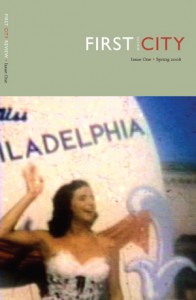 First City Review is “a quarterly journal of pop culture, fiction, essay, poetry, travel, and review that covers the contemporary and idiosyncratic experience of life in Philadelphia and the world beyond.”
First City Review is “a quarterly journal of pop culture, fiction, essay, poetry, travel, and review that covers the contemporary and idiosyncratic experience of life in Philadelphia and the world beyond.”
Issue 1 features new fiction from Thaddeus Rutkowski, Paula Bomer, Johannah Rodgers, Brooke Comer, Leslie Bienen, Alexa Beattie and Chad Willenborg. Poetry from John Grey, Bryon D. Howell, Youssef Rakha and James R. Whitley. Essay by James Wagner. And featuring new photography work from Heather Weston, found photos, and sketches and pencil drawings.
FCR accepts submissions year-round in fiction, essay, poetry, criticism, review and travel.
Spread the word!
Backwards City Throws in the Towel – Permanently?
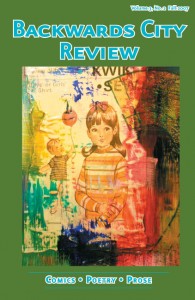 It seems a bit odd, but shortly after posting an “Original Editor’s Farewell” on the site, which spoke of the new blood taking over teh publicaiton, this was posted on the Backwards City Review Blog, Thursday, March 20, 2008:
It seems a bit odd, but shortly after posting an “Original Editor’s Farewell” on the site, which spoke of the new blood taking over teh publicaiton, this was posted on the Backwards City Review Blog, Thursday, March 20, 2008:
“And With That…
And with that, I have some sad news. Backwards City Review is suspending operation as of its 7th issue, which is now back from the printer and being mailed out shortly. There’ll be more details forthcoming, but for now let me say, on behalf of all the editors, past, past, and future, it’s been a lot of fun, and thanks.”
I dropped BCR an e-mail to ask if this was permanent or not, as so often there is “hiatus” status while publications re-organize themselves, but I have not heard back from them. Sadly, in that founding editor’s farewell was the following comment:
“Yes, the founders of the BCR are stepping down. Our city is ripe for regime change. Citizens with pitchforks. Rhythmic chants. But we have not thrown the baby out with the bathwater. This little toddler will continue, there’s a new mayor in town, and remember, it takes a village. Another squad of hungry editors, right at this very moment, is waiting to get their hands on the next batch of oddities that you so crave. The magazine is in excellent hands. Our neighborhood, our city, our backwards nation is strong. It will prosper, thrive, probably get better, as hard as that is to imagine. And if it doesn’t, we’ll bash the kneecaps of each of those youngbloods.”
I don’t think I want to know if any knees were bashed, but I would hope there is some truth to the strength that can prosper and thrive, and that we might not yet have seen the last of BCR. If not, then perhaps the message is one much more prophetically overarching – as one lit mag fades away, I sit here with three inaugural issues of the new lit mag ventures, the next generation of hope and high energy. It is the way of our world.
Spread the word!
Award :: Tupelo Press 2008 Snowbound Chapbook
Winner of the Tupelo Press 2008 Snowbound Chapbook Award
Judge Dana Levin has selected Stacey Waite of Pittsburgh, PA as winner of the 2008 Snowbound Series Chapbook Award. Her manuscript, titled “the lake has no saint,” will be published by Tupelo Press in 2010.
The runners up are:
Jamie O’Halloran of Los Angeles, CA for “The Visible Woman”
John Surowiecki of Amston, CT for “Mr. Niedzwiedzki’s Pink House”
Deb Casey of Eugene, OR for “Spit & Purr”
Other Finalists:
Lisa Beskin – Belchertown, MA, “Shadow Globe”
Remica Bingham – Norfolk, VA, “The Body Speaks”
John de Stefano – New York, NY, “From: Critical Opalescence and the Blueness of the Sky”
Mary Helen Molinary – Memphis, TN, “The Book of 8:38”
Howard Robertson – Eugene, OR, “Three Odes to Gaia”
Robin Beth Schaer – New York, NY, “Almost Tiger”
Suzume Shi – New London, CT, “Ao”
Jacob Shores-Arguello – Fayetteville, AR, “John Barleycorn Must Die”
Janet Sylvester – Kittery, Maine, “The Unbinding”
Semifinalists:
Hadara Bar-Nadav – Kansas City, MO, “Fable of Flesh”
Colin Cheney – Brooklyn, NY, “Here There Be Monsters”
Mark Conway – Avon, MN, “Dreaming Man, Face Down”
John de Stefano – New York, NY, “From: Three-Body Problems”
Joanne Diaz – Chicago, IL, “Violin”
Jennifer Kwon Dobbs – New York, NY, “Mongrel Angels”
Matthew Hittinger – Astoria, NY, “Spectacular Reflection”
Christina Hutchins – Albany, CA, “Dark Creek”
M. Smith Janson – Florence, MA, “Letter Written in this Life, Mailed from the Next”
Jesse Lee Kercheval – Madison, WI, “My Life as a Silent Movie”
Sandra Kohler – Dorchester, MA, “Final Summer”
Gary Copeland Lilley – Swannanoa, NC, “Wade In Da Wahtuh”
Matthew Lippman – Claverack, NY, “Moses”
Mike Maniquiz – Clovis, CA, “Cooking Frutti Di Mare on This Early Evening Before the
Night Falls on Kentucky Hillsides”
Mary Helen Molinary – Memphis, TN, “This Book of Sun”
Rusty Morrison – Richmond, CA, “Insolence”
Teresa Pfeifer – Chicopee, MA, “Little Matryoshka”
Joseph Radke – Milwaukee, WI, “A Source of Reasons”
Boyer Rickel – Tucson, AZ, “reliquary”
Reginald Shepherd – Pensacola, FL, “Photos of the Fallen World: Poems”
Page Hill Starzinger – New York, NY, “Black Tongue”
Barry Sternlieb – Richmond, MA, “Winter Crows”
Jonathan Weinert – Concord, MA, “Charged Particles”
Spread the word!
Jobs :: Various
The MFA Program of Warren Wilson College seeks a full-time resident Director, effective June 1, 2009.
The Department of English at Medgar Evers College invites applications for a full-time tenure-track position teaching Creative and Professional Writing. July 1.
Williams Collge Writing Coordinator, Academic Resource Center. The College is pleased to announce an opening for a full-time Writing Coordinator reporting to the Director of Academic Resources under the auspices of the office of the Dean of the College. Immediate.
Spread the word!
Advice to Poets from Copper Canyon
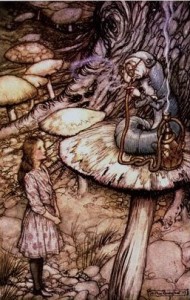 Copper Canyon Press offers an “Advice to Poets” page on their website in response to writers seeking the advice of this publishing guru. The page links to several articles, including: “Becoming a Poet: One Step at a Time” by John Haines; “Advice to Young Poets: How to Make It out of the Slush Pile of Submissions” and “The Don’t and Dos of Cover Letters” by editor Eleanor Hamilton; and “Thirty-two Statements About Writing Poetry” by Marvin Bell. Take it from the pros. It’s free.
Copper Canyon Press offers an “Advice to Poets” page on their website in response to writers seeking the advice of this publishing guru. The page links to several articles, including: “Becoming a Poet: One Step at a Time” by John Haines; “Advice to Young Poets: How to Make It out of the Slush Pile of Submissions” and “The Don’t and Dos of Cover Letters” by editor Eleanor Hamilton; and “Thirty-two Statements About Writing Poetry” by Marvin Bell. Take it from the pros. It’s free.
Spread the word!
Documentary Film :: Including Samuel
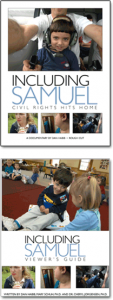 “Photojournalist Dan Habib rarely thought about inclusion before he had his son Samuel seven years ago. Now he thinks about inclusion every day. Habib’s documentary film Including Samuel examines the educational and social inclusion of youth with disabilities as a civil rights issue.
“Photojournalist Dan Habib rarely thought about inclusion before he had his son Samuel seven years ago. Now he thinks about inclusion every day. Habib’s documentary film Including Samuel examines the educational and social inclusion of youth with disabilities as a civil rights issue.
“Including Samuel is built on the efforts of Dan Habib and his family to include Samuel, 7, in all facets of school and community. Including Samuel also features four other families with varied inclusion experiences, plus interviews with dozens of teachers, young people, parents and disability rights experts.”
Spread the word!
NYQ Poetry Database
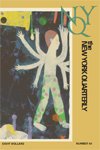 The New York Quarterly has added a unique new feature to their website:NYQ Poets, a searchable database of poets and poems that have appeared in issues of NYQ. Poets whose works have appeared can add their own information to their page, including: photo, announcements, biography, links, audio, video, books and more.
The New York Quarterly has added a unique new feature to their website:NYQ Poets, a searchable database of poets and poems that have appeared in issues of NYQ. Poets whose works have appeared can add their own information to their page, including: photo, announcements, biography, links, audio, video, books and more.
Readers can search poets and poems by name, or browse the full database by leaving search fields blank or entering only a letter (although, avoid the “back” button on your browser – some glitch takes you back to an error page). NYQ links the poem to an order page for the issue in which the work appears. Limited “classic” back issues can be ordered, or digital reprints through Amazon, Barnes and Noble, or Powell’s Books.
Spread the word!
Shambhala Sun Talks to Leonard Cohen
 He Has Tried in His Way to Be Free
He Has Tried in His Way to Be Free
By Sarah Hampson
Sambhala Sun
November 2007
And to a remarkable extent, Leonard Cohen is succeeding. Sarah Hampson had a rare opportunity to spend an afternoon with the famed singer and poet. He’s got the wisdom of age but he’s still the essence of cool—the perfect reflection of his years of Zen.
[. . .] It is often said that Cohen is hard to define. There’s Cohen, the son of a prominent Montreal clothier and the grandson of a Jewish scholar. Cohen, the law-school dropout. Cohen, the novelist, the poet, the songwriter. Cohen, the sexual bad boy who becomes a monk.
But he disagrees. “I always felt it was of one piece. I never felt I was going off on a tangent. Mainly because I think we develop images of ourselves quite early on, and certainly one of the images I had of myself came from reading Chinese poetry at a very young age. There was a kind of solitary figure in some of those poems by Li Po and Tu Fu. A monk sitting by a stream. There was a notion of solitude, a notion of deep appreciation for personal relationships, friendships, not just love, not just sensual or erotic or the love of a man or a woman, but a deep longing to experience and to describe friendship and loss and the consequences of distance. So those images in those poems had their effect, and thirty years later, I found myself in robes and a shaved head sitting in a meditation hall. It just seemed completely natural,” he says in a quiet manner [. . .]
Read the rest on Shambhala Sun.
Spread the word!
Iowa Review Human Rights Indexes
Human Rights Index
The Human Rights Index, a continuing series, is prepared by the UI Center for Human Rights (UICHR) for publication in The Iowa Review three times annually.
First published in the Fall 2001 issue of the The Iowa Review, it is intended to suggest the global political/socio-economic context within which we read and write, reflecting a shared belief that human rights cannot be truly advanced without the virtues of the intuitive as well as the cognitive that are in each of us.
Each of the indexes provides a number followed by a description of the real life, human situation the number represents. For example, from the 2007-08 Winter issue, index on Indigenous Peoples:
4
Number of states (Canada, Australia, New Zealand, United States), each with sizable indigenous populations, that refused to sign the UN Declaration on the Rights of Indigenous Peoples, endorsed by 143 other nations on 13 September 2007, even though the Declaration is technically non-binding (AFP 2007; OHCHR 2007)
The following are provided full-text on the UICHR site:
Winter 2007-08: Indigenous Peoples (#20)
Fall 2007: Global Climate Change (#19)
Spring 2007: Immigration (#18)
Winter 2006-07: Women and Armed Conflict (#17)
Fall 2006: HIV/AIDS in Africa (#16)
Spring 2006: Human Trafficking (#15)
Winter 2005-06: Water (#14)
Fall 2005: Disaster Relief (#13)
Spring 2005: Darfur (#12)
Winter 2004-05: The Iraq War (#11)
Fall 2004: Health Care (#10)
Spring 2004: Hunger (#9)
Winter 2003-04: Genocide (#8)
Fall 2003: Israeli-Palestinian Conflict (#7)
Spring 2003: The United States (#6)
Winter 2002-03: Refugees, Asylum Seekers and Internally Displaced Persons (#5)
Fall 2002: 9/11 and the “War on Terror” (#4)
Spring 2002: Women (#3)
Winter 2001-02: Child Labor (#2)
Fall 2001: Three Generations of Human Rights (#1)
Spread the word!
New Lit on the Block :: First City Review
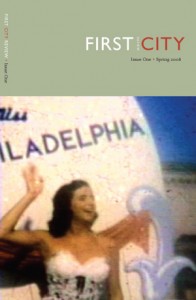 “First City Review is a quarterly journal of pop culture, fiction, essay, poetry, travel, and review that covers the contemporary and idiosyncratic experience of life in Philadelphia and the world beyond. We accept submissions year-round in fiction, essay, poetry, criticism, review and travel. All work must be accompanied by an SASE and cover letters are encouraged.”
“First City Review is a quarterly journal of pop culture, fiction, essay, poetry, travel, and review that covers the contemporary and idiosyncratic experience of life in Philadelphia and the world beyond. We accept submissions year-round in fiction, essay, poetry, criticism, review and travel. All work must be accompanied by an SASE and cover letters are encouraged.”
Issue 1 features new fiction from Thaddeus Rutkowski, Paula Bomer, Johannah Rodgers, Brooke Comer, Leslie Bienen, Alexa Beattie and Chad Willenborg. Poetry from John Grey, Bryon D. Howell, Youssef Rakha and James R. Whitley. Essay by James Wagner. And featuring new photography work from Heather Weston, found photos, and sketches and pencil drawings from some of our friends.
Spread the word!
New Lit on the Block :: The Farallon Review
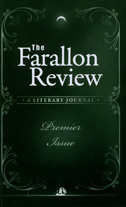 “The Farallon Review is a new literary review featuring contemporary, engaging, and literary prose fiction with a modern view, a classic sensibility, and a west-coast flavor. The Premier Issue contains stories by Jamey Genna, Abeer Hoque, Ken Rodgers, Lynka Adams, and S.J. Sasken.Read about river rafting in the Rocky Mountains, weddings in India, soldiers seeking comfort, families struggling with their past, pigeons mirroring the emotional wasteland around them. We are currently reviewing submissions for our second issue.”
“The Farallon Review is a new literary review featuring contemporary, engaging, and literary prose fiction with a modern view, a classic sensibility, and a west-coast flavor. The Premier Issue contains stories by Jamey Genna, Abeer Hoque, Ken Rodgers, Lynka Adams, and S.J. Sasken.Read about river rafting in the Rocky Mountains, weddings in India, soldiers seeking comfort, families struggling with their past, pigeons mirroring the emotional wasteland around them. We are currently reviewing submissions for our second issue.”
Spread the word!
Crazyhorse Prize Winners Announced
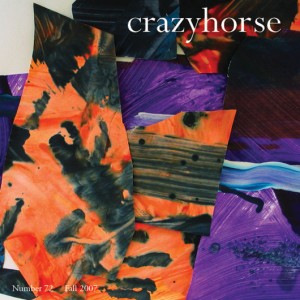 The editors of Crazyhorse are pleased to announce the 2008 Crazyhorse Prize Winners (prize entry deadline of Dec. 20, 2007).
The editors of Crazyhorse are pleased to announce the 2008 Crazyhorse Prize Winners (prize entry deadline of Dec. 20, 2007).
Crazyhorse Fiction Prize
Judged by Ha Jin
Fiction Winner: Miranda Beverly-Whittemore
for the story “Pertussis”
Fiction finalists: Roy Kesey, Marjorie Celona, Cathryn Alpert, Rachel Cassandra, Devon Code.
Lynda Hull Memorial Poetry Prize
Judged by Billy Collins
Poetry Winner: Jeff Walker
for the poem “Itchy Is As Scratchy Does”
Poetry finalists: Alexis Orgera, Jordan Windholz, Claire Millikin, Michael Robins, J. Mae Barizo, Elizabeth Marzoni, Xu Smith, Christopher Howell, Juliet Patterson, Tobey Kaplan.
The two prize winners will each receive $2,000 and the winning story and poem will be published in Crazyhorse Number 74, due out Nov. 1, 2008.
Spread the word!
NewPages Update :: Book Reviews :: June 2008
New book reviews posted on NewPages include the following titles: Lost Books of the Odyssey :: O Woolly City :: I Am Death :: Woman’s Guide to Mountain Climbing :: Bob, or Man on Boat :: Best of the Bellevue Literary Review :: A Man of Ideas :: Breaking It Down :: Translator’s Diary :: Human Mind :: Ravel :: Double Header :: Oh, Don’t Ask Why :: Proper Knowledge :: Do the Math
Spread the word!
Beloit Poetry Forum Starts June 1
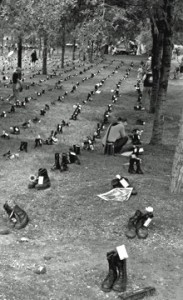 Beloit Poetry Journal
Beloit Poetry Journal
Poet’s Forum
As of June 1, the BPJ site will host a blog. Each month one poet with work in the current issue will post a reflection on that work and invite your questions and comments. The Poet’s Forum poets for the summer issue are:
June 1-30, Erin Malone
July 1-31, Paul Gibbons
August 1-31, John Hodgen
From BPJ: “We hope the forum fosters lively dialogue that strengthens the poetry community the BPJ has contributed to for almost sixty years.” No doubt.
(And might I just say, that IS a lovely zebra you have…)
Spread the word!
Reading the World 2008
 4th Annual
4th Annual
Reading the World
June 2008 (and beyond!)
RTW grew out of a series of informal meetings of booksellers and publishers as a way of introducing American readers to more international authors. As Goethe said back in 1827, “Left to itself every literature will exhaust its vitality if it is not refreshed by the interest and contributions of a foreign one.”
This belief that international literature plays a vital role in book culture is one that is shared by all the publishers and booksellers involved in Reading the World. Twenty-five works of literature have been selected to represent a broad range of cultures, from Portugal to Lebanon, from China to Switzerland, from Chile to Japan.
The publishers include: Archipelago; Dalkey Archive; Eccom; Farrar, Straus and Giroux; Houghton Mifflin Harcourt; Knopf; New Directions; New York Review Books; Other Press; Picador; Columbia University; Copper Canyon; Europa; Graywolf; and Grove.
Starting in June, Words Without Borders will be relaunching its Reading the World Book Clubs, featuring reading guides and moderated discussions of several of the RTW titles.
The web site also includes a list of participating bookstores and a bookstore sign-up form.
[Text from the RTW web introduction by: Karl Pohrt, Shaman Drum Bookshop; Chad W. Post, Open Letter/University of Rochester; Jeff Seroy, Farrar, Straus and Giroux.]
Spread the word!
The Lost Books of the Odyssey
Something wired very hard into the human psyche lights up at the notion of discovering hidden things, putting the pieces together and finally accessing occult knowledge – wisdom or treasure or whatever seems to be missing from human experience – things which, when uncovered, could possibly explain our present situation and hopefully unlock the power to choose our future with certainty. Zachary Mason touches, tickles, and strikes these wires in The Lost Books of the Odyssey and, in the end, creates nothing short of a synaptic fireworks display. Continue reading “The Lost Books of the Odyssey”
Spread the word!
O Woolly City
You’re in an abandoned house. The floorboards are damp and creak under you – what was the reason, again, you decided to go bare-footed? And once in a while something brushes against your face. Sometimes it’s the stray end of a cobweb, sometimes the rusty pull-chain to the chandelier. Sometimes you don’t know. Of course, the lights don’t work. You’re not quite ready to leave, but you’re starting to look for a way out. Sometimes you find stairs going up to strange cupboards; other times the stairs bear you down into musty basements. Continue reading “O Woolly City”
Spread the word!
I Am Death
Gary Amdahl’s I Am Death collects two novellas, the crime story “I Am Death, or Bartleby the Monster (A Story of Chicago)” and “Peasants,” a tale of hostile office politics. The two novellas are strikingly different in setting and tone, allowing Amdahl to display a range of abilities as both a writer and a storyteller. Continue reading “I Am Death”
Spread the word!
A Woman’s Guide to Mountain Climbing
The poems in Jane Augustine’s A Woman’s Guide to Mountain Climbing confront, rather than bypass pain, and their “golden and piercing” music is made from a rugged but precise lineation and a relentless eye for detail. Continue reading “A Woman’s Guide to Mountain Climbing”
Spread the word!
Bob, or Man on Boat
The collected work thus far of Peter Markus could be likened to an early earth encyclopedia, or a table of the elements. In Markus’s world, though, the elements are not cryptic chemical symbols devised and laid in line by science. Instead, they are the epoxy of existence – they are the things we know without having to decipher, they are brothers, fish and mud. One could cut to most any page in a Markus apparatus and find these common images there repeated, like age lines encased in a tree trunk. Markus’s word channels the innate. Each sentence placed next to one another as if by nature, his layered phrases cause an incantation. Continue reading “Bob, or Man on Boat”
Spread the word!
The Best of the Bellevue Literary Review
No human thing is more universal than illness, in all its permutations, and no literary publication holds more credibility on the subject than The Bellevue Literary Review. I say this with upmost confidence as an English professor, a registered nurse, and as someone who recognizes the historical and philosophical origins (and namesake) of this fine literary periodical: Bellevue Hospital Center. Continue reading “The Best of the Bellevue Literary Review”
Spread the word!
A Man of Ideas
“Beware the impractical man,” warns the narrator of the title story of David Galef’s chapbook collection of short and flash fiction: “Their wives either cherish or divorce them, and their sons and daughters, in reaction, often grow commonsensical and a little costive.” That’s funny, but we shouldn’t miss the menacing undercurrent. The unfortunate ideas of Bernardo Lazar – a backyard smelter, a “Reaction Recovery” device, and “a project about giant vegetables” – put his wife and young children through a comic set of trials. So light is Galef’s touch that we hardly notice, until the final sentence, that the Lazar family has come undone. Continue reading “A Man of Ideas”
Spread the word!
Breaking It Down
Rusty Barnes’s Breaking It Down collects nearly twenty flash fictions into an attractive, pocket-size book, a rare instance where the size of the book accurately depicts the size of the stories. Luckily, it is only the page counts of the stories that are small, as the themes and characters contained within each tale loom larger than life, like the low-class tall tales they are. Continue reading “Breaking It Down”
Spread the word!
The Translator’s Diary
The cover of Jon Pineda’s second collection, The Translator’s Diary, which depicts a graceful and nebulous spiral, is eerily reflective of the poems it obscures. Pineda’s poems turn in on themselves, each a pointed and intimate introspection sheathed in the gauze of the lyric, accruing momentum in a sort of ripple effect as the book progresses. Continue reading “The Translator’s Diary”
Spread the word!
The Human Mind
It would be easy to urge you to read The Human Mind because of the natural lure of the characters that people its short prose. There’s a man made of smoke and another of glass; a woman who slips her fingers into the stringy coagulation of her thoughts kept in a bowl; an impoverished Edgar Allan Poe who supports himself “on what he could squeeze out of his brain, a kind of black milk of his words.” Continue reading “The Human Mind”
Spread the word!
Ravel
Jean Echenoz’s latest work Ravel, translated from French, is a novelistic rendering of the final ten years in the life of Maurice Ravel, a wildly famous French concert pianist and composer. Adhering to the musician’s real life in extraordinary detail, Echenoz pens a seamless entry and exit into the previously unexplored soundscape of Ravel’s mind. In a novel consisting of only 117 pages, there isn’t one unnecessary syllable, let alone a dissonant note. Continue reading “Ravel”
Spread the word!
Double Header
Suzanne Burns’s Double Header is a slim chapbook comprised of just two short stories, “An Acquired Taste” and “Tiny Ron.” Both stories are full of magic (one more literally than the other), and both have marriage at their centers, both thematically and as plot devices. Continue reading “Double Header”
Spread the word!
Oh, Don’t Ask Why
Dennis Must’s stories are at times both unsettling and tremblingly genuine, and once the reader gives herself over to them, worth consideration. Not that stories about immolation, cross-dressing, prostitutes, Bible study beauty pageants, family, and loss normally aren’t. It’s just that the stories come on slow, and before you know it, you’re sitting in your living room pondering whether you should be imagining a grieving widower dressing up in his dead wife’s clothing. Continue reading “Oh, Don’t Ask Why”
Spread the word!
A Proper Knowledge
A Proper Knowledge, Michelle Latiolais’s follow up to the family-centered novel Even Now, is another novel focused around family and relationships. Luke is a dedicated, perceptive Los Angeles doctor with a practice treating autistic children – his career choice influenced by his own late sister, a schizophrenic whose memory haunts him at times. Continue reading “A Proper Knowledge”
Spread the word!
Do the Math
Emily Galvin likes details. In her mini-plays that make up the first half of the book, she pencils every texture, breath, and tilt of head with conspicuous meticulousness, as if the rabid observation of minutiae should yield meaning like the sudden breakthrough in a mathematical proof. This approach often leads to pieces that are more description than dialogue, but with focus that renders it powerful, rather than an inanely panning camera eye. The terse dialogues that do ensue have an amplified gravity, and given their binary form, cannot fail to call up Endgame or another of Beckett’s masterpieces. Continue reading “Do the Math”
Spread the word!
Book Review :: Teens and Computers
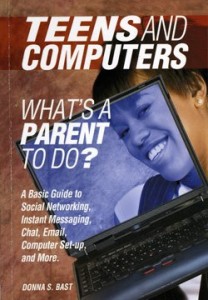 Teens and Computers
Teens and Computers
by Donna S. Bast
2007; 148pp
ISBN 978-1-4196-7075-6
Given my interest in technology and education, I couldn’t resist getting a copy of this book, Teens and Computers: What’s a Parent to Do? A Basic Guide to Social Networking, Instant Messaging, Chat, Email, Computer Set-up and More. I’m a sucker for anything that touts “and more.” Of course, my real agenda in getting this book was to see just how teens were treated. I’ve listened to numerous speakers and read countless efforts by authors to help parents get “in tune” with their teen, and most come off as “us vs. them” masked behind a lot of ageist humor, which only serves to further divide the parent/teen relationship.
Let me further disclaim – I have never raised a teenager. But I work with troubled teens, and I know a lot about what parents do to screw kids up. Donna S. Bast, the author of this book, will not allow that to happen with what she has written here.
Trying to learn hip new technology, I’ve also read several ______ for Dummies books (like for Second Life – I’m STILL not off Welcome Island – Second Life Guantanamo…). The problem with those books: They’re too stupid. Bast’s approach is directed to parents who have some clue about what is out there, and perhaps even use some of the technologies themselves, but don’t quite get how kids use the technologies like oxygen. Bast is able to tap into the realm of how critical these technologies are to teens and their social identities (HUGELY important to teens), and how parents can better work with their teens and technology instead of against both.
The book starts with “What are my Teenagers Doing on the Computer?” and covers IM/Text, chat, blogs, email [old school for teens now!], MySpace, Facebook, Xanga and video portals. Every chapter gives the basics of the technology, its attraction for teens, how new users can access it, what cautions should be heeded, and how to talk with your teen about these concerns.
It’s not until the second part of the book that Bast gets into “Limits for Computer Usage.” But these have been discussed throughout, not so much as taking total control, but how to negotiate responsible usage with your teen. Still, her chapters on “Should I Control…” and “What are the Rules and Consequences…” provide insightful and patiently scripted suggestions. What I think gives Bast the greatest edge in this writing is that she is a computer geek, through and through (her business is Miz Fix-IT Tech). She likes technology and doesn’t want to see it get a bad rap in this parent/teen struggle.
But, the absolute best part of Bast’s book, which I have NEVER seen discussed in any other “how to deal with your teen and technology” forum is the chapter “What Should I Know about Plagiarism and Copyright?” Finally! Thank you Bast! This chapter puts some responsibility on the parents, who are working with their children on homework, to be sure that what their kids write is authentic and not “copy and paste” from the web. She also covers downloading and pirating of music and software. As an educator, this chapter alone (and the appendix on plagiarism) is one I wish every parent of a teen would read and put to use in working with their young scholars.
The rest of the book is devoted to basic computer and Internet education, including computer terms, useful sites, buying a laptop, MORE on plagiarism, and the “dark side” of the Internet. Rather than starting with this material, I like that Bast ends with it. This allows those who need more “basics” to get it, without those who don’t need it feeling as though the book isn’t for them when they open up to the first couple of chapters. Very well planned in terms of delivery of content.
The only drawback to this book that I can see is that it is self-published (available via Amazon and Borders). The double-edged sword. Sure, it’s out there, and I imagine Bast sells them at talks and trainings, but this book would better serve a much wider audience of readers – parents and teachers alike – that could be reached with, say, an academic publisher’s marketing plan. Hello? Scholastic?
Spread the word!
Iowa Review Award Winners Announced
 Winners of the 2008 Iowa Review Awards
Winners of the 2008 Iowa Review Awards
May 29, 2008
Nonfiction
First Prize
Nancy Geyer for “Where the Children Are”
Runner-up
Alexis Nelson
Poetry
First Prize
Dave Snyder for “Bamboo Poem”
Runners-up
Mary Austin Speaker, Stephen Gibson
Fiction
First Prize
Andrew Mortazavi for “Stop Six, Ft. Worth”
Runner-up
Jacob M. Appel
Spread the word!
New Lit Listings on NewPages
New Sponsor
Superstition Review
Created through an imaginative collaboration between faculty and students in the Writing, Literature and Film program at ASU Polytechnic, the magazine is student edited, student written, and student maintained. Superstition Review is published twice yearly in May and December. Submissions (art, poetry, fiction, nonfiction) read fall (September and October) and spring (February and March).
New Lit Mags Listed
Beeswax
J Journal
Whitefish Review
New Online Mags Listed
LITnIMAGE
Survivor’s Review
Spread the word!
Fellow Travelers :: Liberation Portraits by Mark Thompson
Fellow Travelers is a collection of 14 stunning black & white images of Gay male liberation pioneers taken by Mark Thompson, one of the foremost chroniclers of the movement. Thompson is best known for his influential trilogy of books dealing with gay spirituality: Gay Spirit (White Crane Books), Gay Body, and Gay Soul. Fellow Travelers has exhibited at the LA Gay & Lesbian Center, the New York Gay & Lesbian Center, the Los Angeles Episcopal Cathedral, Philadelphia Gay & Lesbian Center, Salt Lake City’s Queer Spirit, SF Public Library, ONE National Gay Archives. If your local glbt organization or gallery would be interested in this great exhibit, contact institute-at-gaywisdom.org.
A three part video program of this project can be found on YouTube:
Fellow Travelers Part 1
Fellow Travelers Part 2
Fellow Travelers Part 3
Spread the word!
Prague Writers’ Festival June 1-5
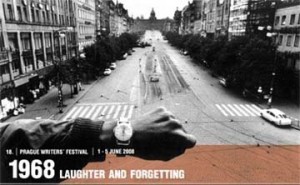 Prague Writers’ Festival 2008
Prague Writers’ Festival 2008
June 1 – 5, 2008
In 2008, the Prague Writers’ Festival celebrates its eighteenth anniversary. The Festival is one of Europe’s leading cultural events, through its unique mix of world-class authors, international media coverage and live broadcasts on the internet. The Festival is co-sponsored by the City of Prague and the Guardian, which presents the Festival through its book pages.
The Festival dates from Keats House, London 1980, when with “Index on Censorship” through the Helsinki Accords we brought vital authors from Central and Eastern Europe to the attention of the public. As Herzen noted: “Fish were born to fly, yet everywhere they swim.” Fortunately in 1991, we could fly east and bring outstanding authors to Prague. In 1997, the Festival became a Czech cultural foundation.
Festival Authors and Moderators
Tariq Ali, Homero Aridjis, Margaret Atwood, Paul Auster, Slavenka Drakulić, Graeme Gibson, Natalia Gorbanevskaya, Jiří Gruša, Siri Hustvedt, Paul Kahn, Ivan Klíma, Petr Král, Günter Kunert, Antonín J. Liehm, Arnošt Lustig, Michael March, Michael McClure, Dimitris Nollas, Jiří Pehe, Igor Pomerantsev, Katerina Anghelaki-Rooke, Elena Schwarz, Ludvík Vaculík, Gary Younge
Spread the word!
Bellingham Review Adapts
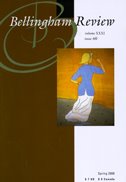 Brenda Miller, Editor of Bellingham Review, writes in issue 60 of recent changes at BR, brought on by a number of factors, not the least of which include the increased costs of both printing and mailing two issues a year. In response to this, BR shows an adaptive turn:
Brenda Miller, Editor of Bellingham Review, writes in issue 60 of recent changes at BR, brought on by a number of factors, not the least of which include the increased costs of both printing and mailing two issues a year. In response to this, BR shows an adaptive turn:
“So, beginning in 2008, the Bellingham Review will experiment with publishing and mailing only one print edition a year (a hefty edition, with same high production values you’ve come to expect), and we will finally overcome our technology phobias and work on making the Bellingham Review website a much more impressive and interactive venue for our readers. We plan to post more of our content online, with special features—such as current book reviews and author interviews—available only in this format…” [read the full letter here]
BR isn’t the first to make this response in the face of hard economic times (or should I say “harder” since the MO of small press endeavors is always hard). As much as we did, will continue, and have every right to grumble and complain about the plight of “small publications,” and fight against rising costs, for those who can respond as BR has, the change can create new avenues. Better? Time will tell, but for now: “You think I’d crumble, you think I’d lay down and die? Oh no, not I. I will survive…”
Spread the word!
Awards :: Glimmer Train March Open
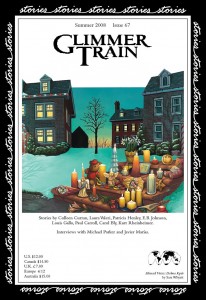 Glimmer Train has chosen the three winning stories of their March Fiction Open competition! This quarterly competition is open to all writers and all themes. Submissions may be sent for the June Fiction Open using the online submissions system at www.glimmertrain.org.
Glimmer Train has chosen the three winning stories of their March Fiction Open competition! This quarterly competition is open to all writers and all themes. Submissions may be sent for the June Fiction Open using the online submissions system at www.glimmertrain.org.
First place: Frederick Reiken of Shutesbury, Massachusetts, wins $2000 for “Shadow”. His story will be published in the Winter 2009 issue of Glimmer Train Stories.
Second place: Yelizaveta Renfro of Sidney, Nebraska, wins $1000 for “Splendid, Silent Sun”. Her story will also be published in an upcoming issue of Glimmer Train Stories.
Third place: Emma Roper-Evans of London, England, wins $600 for “Rice Dish”. Her story will also be published in an upcoming issue of Glimmer Train Stories, increasing her prize to $700.
Spread the word!
NewPages on Facebook
Thanks to Book Review Editor Matt Bell, NewPages once again has a presence on Facebook. Stop on by and become a Fan of NewPages! Updates include book reviews, lit mag reviews, submissions, and more – including the coolness factor of having yet another Facebook Friend!
Spread the word!
E-Lit Conference Call for Papers 6.20
Call for Papers and Works
Seminar on Electronic Literature in Europe
University of Bergen in Bergen, Norway
September 11-13th, 2008
The Fall 2008 Bergen Seminar on Electronic Literature in Europe will build upon the work of the e-poetry seminar held in Paris in February 2008 at the University Paris 8, the 2007 e-poetry conference in Paris, the 2007 Remediating Literature Conference in Utrecht, and other recent activity in the field of electronic literature in Europe. Deadline for proposals June 20.
[Posted on jill/txt blog.]
Spread the word!
Jobs :: Various
The Fine Arts Center of the School District of Greenville, South Carolina seeks a Director of Creative Writing. Betty Gerow.
The University of Pittsburgh at Johnstown Program in Creative & Professional Writing seeks visiting assistant professor/instructor for academic year 2008-2009; one-year appointment, potential for yearly renewal. Frances Zauhar, Chair, Humanities Division. June 1, 2008.
Spread the word!
New Site Launch :: The New Criterion
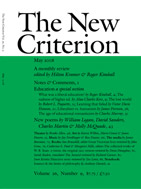
“The New Criterion, now co-edited by the art critic Hilton Kramer and Roger Kimball, was founded in 1982 by Mr. Kramer and the pianist and music critic Samuel Lipman. A monthly review of the arts and intellectual life . . . Serious, but not academic . . . a staunch defender of the values of high culture, an articulate scourge of artistic mediocrity and intellectual mendacity wherever they are found. . .”
The May 2008 issue includes a special feature on eduction, with online content providing limtied content access (subscribers have full access). The following
Articles
Introduction: What was a Liberal education? by Roger Kimball
An introduction to our special issue on education.
The New Learning that Failed by Victor Davis Hanson
On the value of classical learning.
The Age of Educational Romanticism by Charles Murray
On requiring every child to be above average.
Poems
The Old Story by William Logan
The Fossil-Finder by David Sanders
Some Kind of Happiness by Charles Martin
The Other Osprey by Molly McQuade
Art
Gallery Chronicle by James Panero
On “John Dubrow: Paintings” at Lori Bookstein Fine Art, “Wayne Thiebaud: The Figure” at Allan Stone Gallery, “Gregory Crewdson” at Luhring Augustine, and “Lois Dodd: Landscapes and Structures, a Survey Exhibition” at Alexandre Gallery.
Spread the word!
Bejeezus – 2008
Bejeezus is subtitled “Reclaiming Southern Culture,” but its coverage of culture extends far beyond its Kentucky roots. Encompassing the broad categories “See, Watch, Read, Eat, Listen, Make, Visit, & More…” the magazine provides short columns on each, keeping the publication varied and concise. Continue reading “Bejeezus – 2008”
Spread the word!
CALYX – Winter 2008
What impressed me the most about this issue of Calyx was how it contained an extraordinary range of voices and styles while still maintaining a high standard of artistic craft that managed to speak to a highly diverse audience. While some of the poems, stories, and artwork in this issue didn’t strike me as “read-again” favorites, there was no question in my mind that they were examples of excellent, above average work. Continue reading “CALYX – Winter 2008”
Spread the word!
The Chattahoochee Review – Winter 2008
For those of you familiar with the Chattahoochee Review’s twenty-five year publishing history, this probably won’t come as a big surprise; but for me, a newcomer to the magazine, I knew as soon as I read John Stazinski’s heartbreaking short story “Waiting for a Dog to Run,” that the CR had achieved a level of literary sophistication that far outran the rest. I instantly realized I now had a new standard with which to measure my critiques. Continue reading “The Chattahoochee Review – Winter 2008”
Spread the word!
The Cincinnati Review – Winter 2008
The Cincinnati Review has, in its five years of existence, built a reputation as an outstanding, and beautifully produced, literary magazine. Each issue includes a full-color portfolio of a contemporary artist’s work, as well as three writers’ reviews of a single book, allowing for dialogue between and among the arts. Continue reading “The Cincinnati Review – Winter 2008”
Spread the word!
Fairy Tale Review – 2007
An ornate frame graces the cover of the Fairy Tale Review, now in its third issue. Inside the frame, a stark grey-and-white etched oval that opens a space in the violet background where a cloaked woman embraces a cloaked child. Both rise from the supine body of a menacing creature – a wolf? – who lies on his back as if dead, but whose open eyes and waving limbs suggest otherwise. “Violet,” editor Kate Bernheimer writes, can be misread as “violent,” and, as the cover image and this mistake-in-waiting suggest, fairy tales traffic in this tension. Continue reading “Fairy Tale Review – 2007”
Spread the word!
The Hollins Critic – February 2008
This issue of the Hollins Critic focuses on Milton Kessler. The front cover features a portrait sketch and an excerpt from his poem “Tiny Flashes Always”: “To sing was the only way through High School and life.” Liz Rosenberg’s essay lauds Kessler as a teacher, a poet, and a human being. He had an eclectic teaching style in which he would ask random questions and make poets post their poems around the room. Although he wrote a lot of poetry, he rarely sent his work out to be published. He also “helped [poets] with their personal lives and health and finances,” so that his actions spoke as loudly as his poetry (4). Rosenberg’s essay celebrates Kessler’s life and poetry, and the two dozen excerpts included make the reader want to read more of Kessler’s work. Continue reading “The Hollins Critic – February 2008”
Spread the word!
The Kenyon Review – Spring 2008
The Kenyon Review opens with a note from David H. Lynn describing a new project: KR Online. Although the editor mentions that pieces selected for online publication may be different than those selected for the journal, he promises that the “critical judgment and standards will remain intact.” If the online pieces are held to as high standard as those in the journal, readers should check out this new online addition. Continue reading “The Kenyon Review – Spring 2008”
